Boys from Syracuse (The)
Musical (1938)
Adaptation: The Comedy of Errors - Shakespeare

The Boys from Syracuse est un musical avec de la musique de Richard Rodgers et des paroles de Lorenz Hart, basées sur la pièce de William Shakespeare, The Comedy of Errors, adaptée par le librettiste George Abbott. La partition comprend du swing et d’autres rythmes contemporains des années '30. Le spectacle est le premier musical basé sur une pièce de Shakespeare.
La pièce est créée à Broadway en 1938. Le spectacle a reçu de très bonnes critiques et la musique est considérée comme l’une des meilleures des spectacles du duo Rodgers & Hart. Le spectacle a été un succès financier et a tenu l'affiche une saison, mais compte tenu des critiques les plus enthousiastes et la popularité des chansons, cette période est étonnamment courte.
Comme le raconte l’histoire, Rodgers et Hart étaient dans un train pour Atlantic City, où leur I Married An Angel () était en répétition, quand Rodgers a demandé à Hart d'imaginé un spectacle basé sur Shakespeare. Aujourd’hui, bien sûr, après West Side Story () (considérée comme un des meilleurs musicals de l'histoire) et Rockabye Hamlet () (peut-être l'un des pires de l'histoire), et plusieurs spectacles entre les deux, l’idée aurait sans doute suscité à Hart une reponse du type: «Et pourquoi pas un opéra-rock?», mais au début de 1938, aucun musical basé sur Shakespeare n’avait atteint Broadway, et Hart a aimé le principe.
Il a particulièrement aimé l’idée de créer une opportunité pour son jeune frère, l’humoriste Teddy Hart. Teddy avait un problème: il ressemblait beaucoup à un autre comique plus connu, Jimmy Savo; mais la ressemblance pouvait être mise à profit dans une adaptation de The Comedy Of Errors, dans laquelle les rôles de basse comédie des jumeaux Dromios sont la base du spectacle.
Rodgers et Hart ont fait venir George Abbott, qui travaillait avec eux par intermittence depuis Jumbo () en 1935. Pour The Boys From Syracuse (), Abbott allait produire, mettre en scène et adapter la pièce. «Le livret qu’il a écrit était exactement ce que nous voulions», a rappelé Rodgers dans le New York Herald Tribune à l’époque du revival de 1963, «brillant, avançant rapidement, mais, dans son propre style loufoque, très dans la tradition grivoise shakespearienne.»
Le 23 novembre 1938, The Boys From Syracuse () a été, étonnamment, le sixième spectacle de Rodgers et Hart à Broadway en trois ans. Mais malgré une belle distribution qui comprenait Eddie Albert, Muriel Angelus et Burl Ives, les critiques ont été mitigées, et le spectacle a tenu l'affiche seulement 235 représentations. Pour la plupart des auteurs, cela aurait été un hit mais mais pas pour Rodegrs et Hartc'était une déception.
La chanson This Can’t Be Love, cependant, a atteint le top 10 national à deux reprises en 1938-39, dans les enregistrements de Horace Heidt puis de Benny Goodman en 1939. Falling In Love With Love de Frances Langford a été un second succès du spectacle.
Abbott met en scène et George Balanchine chorégraphie la production originale, qui ouvre sur Broadway à l'Alvin Theater le 23 novembre 1938, après des Try-Out à New Haven et Boston. Le spectacle ferme le 10 juin 1939 après 235 représentations. Il a mis en vedette Eddie Albert (Antipholus de Syracuse), Ronald Graham (Antipholus d’Ephèse), Teddy Hart (Dromio d’Ephèse), Jimmy Savo (Dromio de Syracuse), Muriel Angelus (Adriana) et Marcy Westcott (Luciana).
Le spectacle a été repris Off-Broadway au Theatre Four le 15 avril 1963 pour 500 représentations. Mise en scène par Christopher Hewett, la distribution met en vedette Stuart Damon (Antipholus of Syracuse), Clifford David (Antipholus of Ephesus), Danny Carroll (Dromio of Syracuse), Rudy Tronto (Dromio of Ephesus), Ellen Hanley (Adriana), Julienne Marie (Luciana) et Cathryn Damon.
Une production dans le West End de Londres a ouvert au Theatre Royal Drury Lane le 7 novembre 1963, basée sur la production off-Broadway, mettant en vedette Denis Quilley, Maggie Fitzgibbon, Paula Hendrix, Pat Turner, Sonny Farrar, Adam Deane, John Adams, Edward Atienza, Ronnie Corbett, Lynn Kennington et Bob Monkhouse.
Une version cinématographique est sortie le 9 août 1940 par Universal Pictures. Réalisé par A. Edward Sutherland, le film met en vedette Allan Jones dans les rôles doubles des deux Antipholus, Joe Penner dans les rôles doubles des Dromio, Martha Raye et Irene Hervey.
Un revival dirigé par Judi Dench a été monté au Regent’s Park Open Air Theatre à Londres en juillet et août 1991, et a fait un UK-Tour en septembre et octobre 1991. Louise Gold a joué Adriana.
Le revival du Roundabout Theatre a débuté à Broadway à l'American Airlines Theatre le 18 août 2002 pour 73 représentations et 29 previews. Le revival a présenté un nouveau livret de Nicky Silver basé sur le livret original. Il a été mis en scène par Scott Ellis avec des chorégraphies de Rob Ashford, et la distribution comprenait Jonathan Dokuchitz (Antipholus de Syracuse), Tom Hewitt (Antipholus d’Ephèse), Lee Wilkof (Dromio de Syracuse), Chip Zien (Dromio d’Ephèse), Erin Dilly (Luciana) et Lauren Mitchell (Adriana).
Les jumeaux Antipholus d’Ephèse (Ronald Graham) et Antipholus de Syracuse (Eddie Albert), séparés quand ils étaient jeunes, ont pris des domestiques jumeaux, tous deux nommés Dromio (Teddy Hart et Jimmy Savo). Lorsque le duo de Syracuse vient à Ephèse, s'ensuit une comédie d’erreurs qui implique la femme Adriana (Muriel Angelus), sa sœur Luciana (Marcy Wescott), et d’autres dans la ville.
Afficher le synopsis détaillé
Acte I
We are in the ancient Asia Minor city of Ephesus, whose Duke has taken a novel approach to the balance of payments situation: anyone from the rival trading city of Syracuse caught in Ephesus is put to death, unless he can pay a large ransom. (Syracuse apparently does the same, so there.)
Sure enough, an aged merchant from Syracuse has been found and brought before the Duke, but all we hear of them, in a brilliant bit of musical theater, are two clarinets, an E flat and a bass (backed with other orchestration here). In I Had Twins, a Sergeant of Police reports the action to us and to a loony mob-chorus right out of Duck Soup, who can't wait for the axe to fall There's going to be a killing, hurrah, hurroo!.
The old merchant's story is a sad one: years before, in a storm at sea, he lost his wife and one of his twin sons (both of whom, with a remarkable lack of creativity, he had named Antipholus). One of the twin servant boys (both named Dromio; those wacky Syracusans) was also lost. More recently, the son who was saved has gone off in search of his lost brother, taking with him the other Dromio, and has failed to return. The old man, who now has no one, has come after them.
The Duke is unmoved; the merchant has no money; the execution is set for noon the next day, which provides the suspense. And for those who haven't already guessed, both Antipholuses and both Dromios happen to be in Ephesus right at this moment. The twin who was lost at sea is now a prosperous merchant with his servant; both are married, not unhappily, really, but not faithfully, either. The other two have just wandered into town, weary from their searches and about ready to give up. This Antipholus only wants to go back to Dear Old Syracuse. He tells his Dromio (Carroll) to book passage on the next ship out.
Across town, the other Dromio and his fat and otherwise insatiable wife, Luce are having another domestic squabble What Can You Do With A Man?
The other marriage in the house, that of Antipholus and Adriana, won't win any prizes either. Antipholus ignores his wife and dallies with courtesans, leaving her to complain to her sister Luciana about the crumbling of her illusions: Falling In Love With Love. Tired of waiting, Adriana sets out to drag him home.
The mistaken identities now begin to multiply, with a lot of Groucho-Chico business between the respective Antipholuses and Dromios; the Dromios get hit over the head with Punch-and-Judy frequency. Adriana finds the wrong Antipholus, and he - afraid to be unmasked as a Syracusan - reluctantly goes home with her. As we consider what might happen there, the other Antipholus reappears, with friends and courtesans, and makes it clear that he really does love his wife: The Shortest Day Of The Year. Back at the house, the complications increase: Antipholus of Syracuse, while fending off Adriana's advances, sees her sister, and for both of them it's love at first sight. As soon as Adriana is out of the room, they try to figure it out: This Can't Be Love.
As night falls, Adriana and Luce go off to bed with the wrong Antipholus and Dromio, just as the two husbands finally return home to find the doors already locked. Another crazy crowd forms, Adriana won't let the husbands in, and as the first-act curtain comes down, the rightful Antipholus and Dromio are going off to spend the night with courtesans.
Acte II
Act Two begins the next morning, with the emergence of the courtesans Ladies Of The Evening to tell their troubles to the cops, who have nothing better to do at this hour than to arrest them. At the home of Antipholus, Luce and the wrong Dromio have only just got out of bed when she catches him flirting with the housemaids, and the now-arguing couple archly imagine a very modern marriage in which both partners go off and do as they please: "He And She".
Adriana and the wrong Antipholus, however, have not consummated anything: he complained of a headache and went off to sleep alone; Adriana is therefore uncompromised. The unhappiest couple in Ephesus are now Luciana, in love with a man she believes is her sister's husband, and Antipholus of Syracuse, in love with a woman who pushes him away, pursued by another who claims to be his wife, and generally lost in the Twilight Zone. Fed Up, he tells Luciana he's getting on a ship and never coming back, however much he may miss her: You Have Cast Your Shadow On The Sea.
The next complication involves a gold chain, bought but not paid for by one Antipholus and given to the other. In the confusion the hometown Antipholus is arrested for non-payment, and sings , as he is hauled off by the cops, the laugh out loud-funny Come With Me (to jail). Back at the house, Luciana finally tells his Adriana what's been going on, and Adriana is more resigned than angry; it' s just the way men are. Luce joins them, and all agree it's best to Sing For Your Supper. Word arrives of Antipholus' arrest, and everyone charges to the rescue. One by one , the central characters wander into the market square , where we find the chief courtesan , who expected to receive the gold chain, complaining to everyone that she can't find an honest man Oh, Diogenes.
At the Temple of Justice, all knots are unravelled: the merchant is ransomed, his sons restored to him; Luciana and Antipholus of Syracuse have a clear path to the altar; Antipholus of Ephesus has learned to appreciate his wife, although we suspect he will still be no stranger to the courtesans; and Adriana, for her part, is told by a seeress, "The venom clamor of a jealous woman poisons more deadly than a mad dog's tooth." In case we missed this sole line retained from The Comedy Of Errors, one of the Dromios leaps out and cries, "Shakespeare!"
1 Boys from Syracuse (The) est une adaption à la scène d'une oeuvre littéraire: The Comedy of Errors - Shakespeare.
Acte I
“I Had Twins” (aka “He Had Twins”) (Bob Lawrence, James Wilkinson, Ensemble)
“Dear Old Syracuse” (Jimmy Savo, Eddie Albert; danced by Eddie Albert, Alice Craig, Vivien Moore, Lita Lede, Claire Wolf, Dancers)
“What Can You Do with a Man?” (Wynn Murray, Teddy Hart)
“Falling in Love with Love” (Muriel Angelus, Ladies)
“The Shortest Day of the Year” (Ronald Graham, Delores Anderson, Policemen; danced by Betty Bruce, Heidi Vosseler, George Church)
“This Can’t Be Love” (Marcy Wescott, Eddie Albert)
“Let Antipholus In” (Company)
Acte II
“Ladies of the Evening” (Bob Lawrence, James Wilkinson, Policemen, Courtezans; danced by Heidi Vosseler and George Church)
“He and She” (Wynn Murray, Jimmy Savo)
“You Have Cast Your Shadow on the Sea” (Marcy Wescott, Eddie Albert)
“Come with Me” (Bob Lawrence, Ronald Graham, James Wilkinson, John Clarke, Singers)
“Big Brother” (Teddy Hart)
“The Ballet” (aka “Big Brother Ballet” and “Twins’ Ballet”) (Jimmy Savo, Eddie Albert, Buddy Douglas, Heidi Vosseler, Robert Howard, Wynn Murray, Dancers)
“Sing for Your Supper” (Muriel Angelus, Marcy Wescott, Wynn Murray, Ladies; danced by Betty Bruce, ensemble)
“Oh, Diogenes” (Wynn Murray; danced by George Church, Betty Bruce, Ensemble)
Finale (“Happy Ending,” per program) (Ensemble)
Aucun dossier informatif complémentaire concernant Boys from Syracuse (The)
Aucun dossier informatif complémentaire concernant Boys from Syracuse (The)
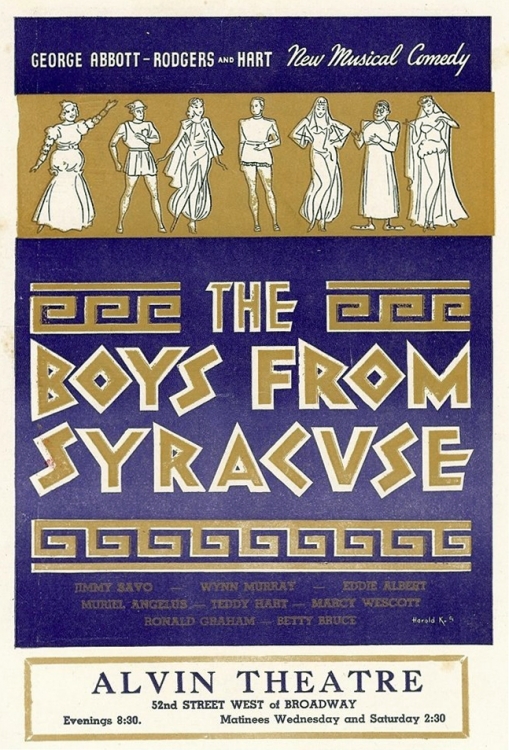
Version 1
Boys from Syracuse (The) (1938-11-Alvin Theatre-Broadway)
Type de série: Original BroadwayThéâtre: Neil Simon Theatre (Broadway - Etats-Unis) Durée : 6 mois 2 semaines Nombre : 235 représentationsPremière Preview : 23 November 1938
Première: 23 November 1938
Dernière: 10 June 1939Mise en scène : George Abbott • Chorégraphie : George Balanchine • Producteur : Star(s) : Avec: Robert Sidney (Mask), Harry Peterson (Mask), Bob Lawrence (Singing Policeman), James Wilkinson (Another Policeman), Ronald Graham (Antipholus of Ephesus), Teddy Hart (Dromio of Ephesus), George Church (Dancing Policeman), Clifford Dunstan (Tailor, Merchant of Ephesus), Burl Ives (Tailor’s Apprentice), Eddie Albert (Antipholus of Syracuse), Jimmy Savo (Dromio of Syracuse), Byron Shores (Merchant of Syracuse), Carroll Ashburn (Duke of Ephesus), John O’Shaughnessy (Aegeon), Wynn Murray (Luce), Muriel Angelus (Adriana), Marcy Wescott (Luciana), Owen Martin (Sorcerer), Betty Bruce (Courtezan [Courtesan]), Heidi Vosseler (Secretary of Courtezan), Dolores Anderson (Assistant Courtezan), John Clarke (Angelo), Florine Callahan (First Maid), Claire Wolf (Second Maid), Alice Craig (Third Maid), Florence Fair (Seeress), Buddy Douglas (Little Antipholus); Singers: Grace Albert, Laura Kellogg, Dolores Anderson, Armonce Wilkins, Marguerite Benton, Margaret Walsh, James Wilkinson, Joseph Scandur, Joe Granville, Herbert Wood; Dancers: Libby Bennett, Ruth Brady, Renee Cettel, Stella Clausen, Alice Craig, Bee Farnum, Ruth Gormley, Claire Harvey, Lita Lede, Connie Leslie, Vivien Moore, Florine Callahan, Mildred Solly, Anna Mae Tesslo, Davenie Watson, Betty De Elmo, Claire Wolf, Mickey Alvarez, Sidney Gordon, Dan Karry, Tommy Lynch, Jack Malis, Edwin Mills, Harry Peterson, Joe Harris, Lee Tannen, Beau Tilden, Robert Howard
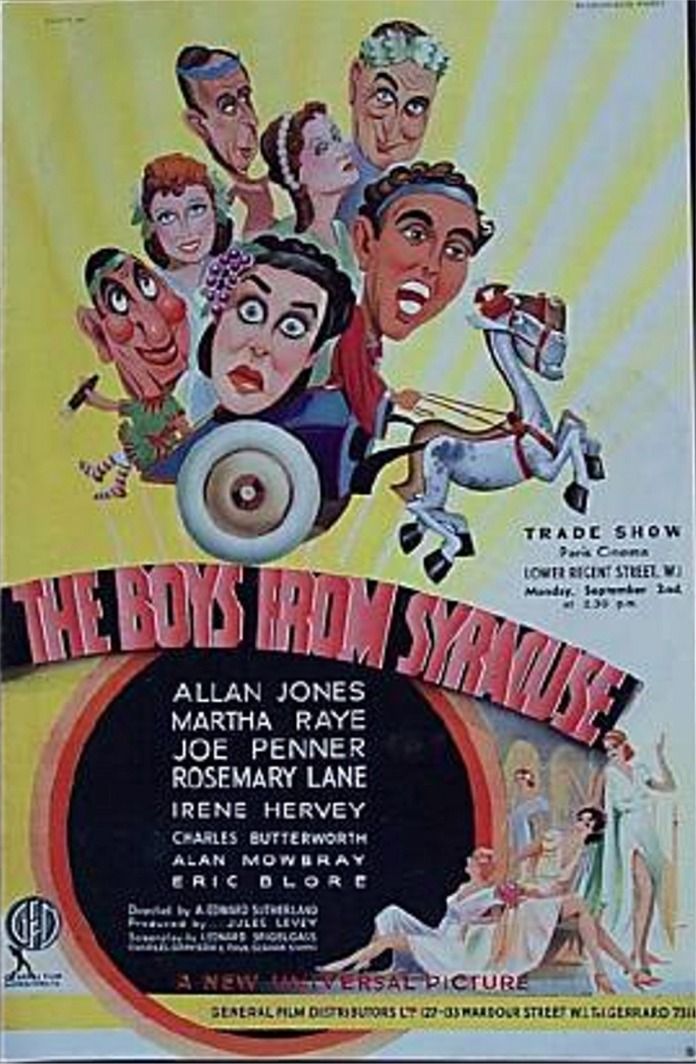
Version 2
Boys from Syracuse (The) (1940-08-Film)
Type de série: FilmThéâtre: *** Film (*** - ***) Durée : Nombre : Première Preview : 09 August 1940
Première: 09 August 1940
Dernière: 09 August 1940Mise en scène : A. Edward Sutherland • Chorégraphie : Producteur : Star(s) : Avec: Allan Jones (Antipholus of Ephesus and Antipholus of Syracuse); Irene Hervey (Adriana); Martha Raye (Luce); Joe Penner (Dromio of Ephesus and Dromio of Syracuse); Alan Mowbray (Angelo); Charles Butterworth (Duke of Ephesus); Rosemary Lane (Phyllis); Samuel S. Hinds (Angeen); Tom Dugan (Octavius); Spencer Charters (Turnkey); Doris Lloyd (Woman); Larry J. Blake (Announcer); Eddie Acuff (Taxi Cab Driver); Matt McHugh (Bartender); David Oliver (Messenger); Bess Flowers (Woman); Cyril Ring (Guard); Julie Carter (Girl); Eric Blore (Pinch); William Desmond (Citizen (uncredited))Presse : "Considering that it was adapted from a Broadway musical by Richard Rodgers, Lorenz Hart and George Abbott, The Boys From Syracuse must rank as a disappointment, though it manages to remain entertaining throughout its surprisingly brief 74-minute running time. Like its theatrical predecessor, the film was inspired by Shakespeare's The Comedy Of Errors ("After a play by William Shakespeare long, long after" reads the opening title). In ancient Ephesus, young tyrant Antipholus (Allan Jones) sentences elderly merchant Aegeon (Samuel S. Hinds) to death unless the latter can come up with a handsome ransom. What Antipholus doesn't know is that Aegeon is his own father; he also doesn't know that he has a twin brother, also named Antipholus (and also played by Allan Jones) who has just arrived from Syracuse in search of dear old daddy. Further complicating matters is that Antipholus of Ephesus and Antipholus of Syracuse both have slaves named Dromio (Joe Penner)-likewise identical twins! The mistaken-identity angle is played to the hilt, with A. of E.'s wife Adriana (Irene Hervey), A. of S.'s girlfirend Phyllis (Rosemary Lane), and Dromio of Ephesus' main squeeze Luce (Martha Raye) ending up just as confused as everyone else. Only four of the original Rodgers & Hart songs were retained-"This Can't Be Love", "Falling In Love With Love", "Sing For Your Supper", and "Oh, Diogenes"-while two new ones were written for the film. Most of the best jokes are based on anachronisms, with Dromio the slave organizing a labor union (complete with placards), a cheering section at an execution shouting "Give him the ax", and a parchment newspaper bearing such headlines as "Ephesus Blitzkriegs Syracuse". Originally purchased by Universal as a vehicle for the Ritz Brothers, The Boys from Syracuse isn't any great shakes, but it would certainly be well worth seeing again (last telecast in the 1970s, it seems to have fallen off the face of the earth in recent years!)" Hal Erickson
"Richard Rodgers and Lorenz Hart's superbly melodic score for their hit The Boys From Syracuse, first presented on Broadway in 1938, received short shrift from producer Jules Levey, whose filmed version of this quintessential tale of mistaken identity (based on Shakespeare' s The Comedy of Errors ) fell just this side of disaster. Numbers like "Sing For Your Supper," "Falling In Love With Love," "He And She" and "This Can't Be Love" - classics every one of them were only included by default, or in truncated versions that failed to do them justice, while new ones (such as "Who Are You?" and "The Greeks Have No Word For It") were added. Leonard Spigelgass and Charles Grayson's screenplay (based on the George Abbott stage version) traded in anachronisms at the expense of the satire originally intended, with cigar smoking Greeks and checkered chariot-cabs typical of the humour on offer." Clive Hirschhorn - The Hollywood Musical
"Hollywood, or at least Universal, should be hanged for what it did to the celebrated Broadway show by George Abbott and Rodgers and Hart (based on The Comedy of Errors). The rewriting was so disastrous that the studio finally cut the picture down to 74 minutes, which doesn't leave much time for Martha Raye and Charles Butterworth or for the wonderful songs—"Falling in Love with Love," "Sing for Your Supper" and "This Can't Be Love." The cast includes Allan Jones, Joe Penner, Rosemary Lane, Irene Hervey, and Alan Mowbray. Directed by Eddie Sutherland; the dance director was Dave Gould. " Pauline Kael
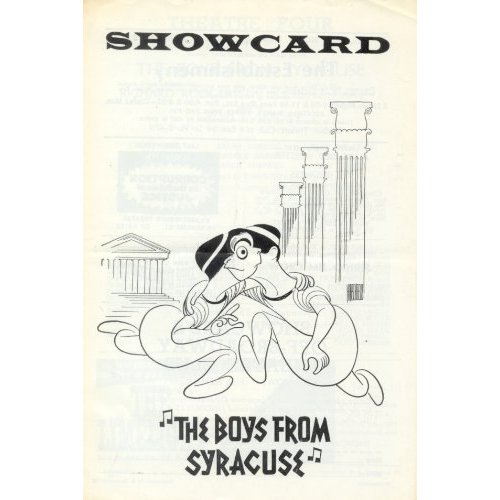
Version 3
Boys from Syracuse (The) (1963-04-Theatre Four-Off Broadway)
Type de série: RevivalThéâtre: Theatre Four (Broadway (Off) - Etats-Unis) Durée : 1 an 2 mois 2 semaines Nombre : 502 représentationsPremière Preview : Inconnu
Première: 15 April 1963
Dernière: 28 June 1964Mise en scène : Christopher Hewett • Chorégraphie : Bob Herget • Producteur : Star(s) : Avec: Danny Carroll (Dromio of Syracuse); Charlene Carter (Courtesan/Amazon); Richard Colacino (Merchant of Syracuse); Cathryn Damon (Courtesan); Stuart Damon (Antipholus of Syracuse); Clifford David (Antipholus of Ephesus); Jeane Deeks (Apprentice/Maid/Amazon); Ellen Hanley (Adriana); Betsy Hepburn (Maid); Fred Kimbrough (Duke); Violetta Landek (Courtesan/Galatea); Julienne Marie (Luciana); Svetlana McLee (Maid/Amazon); Karen Morrow (Luce); Zebra Nevins (Fatima); Richard Nieves (Angelo/Pygmalion); Gary Oakes (Sergeant); Jim Pompeii (Tailor/Merchant of Ephesus); Dom Salinaro (Corporal); Matthew Tobin (Aegeon/Sorcerer); Rudy Tronto (Dromio of Ephesus)Commentaires longs: Le livret a été adapté pour cette version par Fred Ebb. Fred Ebb was not credited for his book revisions to this production, which was then licensed and supplanted the original version. In addition to dialogue revisions, the end of the first act in this version was largely reconceived: "Let Antipholus In" was cut and a ballet ("Ladies Choice") was added.
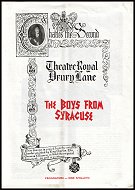
Version 4
Boys from Syracuse (The) (1963-11-Drury Lane Theatre-London)
Type de série: Original LondonThéâtre: Drury Lane Theatre (Londres - Angleterre) Durée : Nombre : 100 représentationsPremière Preview : Inconnu
Première: 07 November 1963
Dernière: InconnuMise en scène : Christopher Hewett • Chorégraphie : Bob Herget • Producteur : Star(s) : Avec: Bob Monkhouse (Antipholus of Syracuse), Maggie Fitzgibbon (Luce), Lynn Kennington (Adriana), Paula Hendrix (Luciana), Ronnie Corbett (Dromio of Syracuse) , Sonny Farrer (Dromio of Ephesus), Denis Quilley (Antipholus of Ephesus)Commentaires longs: Le livret a été adapté pour cette version par Fred Ebb. Fred Ebb n’a pas été crédité pour ses révisions du livret à cette production, qui a ensuite été sous licence et a supplanté la version originale. En plus des révisions du dialogue, la fin du premier acte dans cette version a été largement reconçue : "Let Antipholus In" a été coupé et un ballet ("Ladies Choice") a été ajouté.
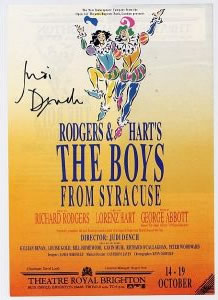
Version 5
Boys from Syracuse (The) (1991-07-Open Air Theatre, Regent's Park-London)
Type de série: RevivalThéâtre: Open Air Theatre, Regent's Park (Londres - Angleterre) Durée : 1 mois 1 semaine Nombre : Première Preview : 22 July 1991
Première: 24 July 1991
Dernière: 05 September 1991Mise en scène : Judi Dench • Chorégraphie : Kenn Oldfield • Producteur : Star(s) : Avec: Cast: Peter Woodward (Antipholus of Syracuse), Jenny Galloway (Luce), Louise Gold (Adriana), Gillian Bevan (Luciana), Richard O’Callaghan (Dromio of Syracuse), Gavin Muir (Dromio of Ephesus), Bill Homewood (Antipholus o f Ephesus)Commentaires : Autumn the production went on tour, including playing The Forum Theatre Billingham Cleveland around 17 September 1991, and Theatre Royal Brighton from 14 to 19 October 1991.Presse : "After the second rude interruption, Louise Gold, as Adriana declared it was a lovely day. Huddled under our macs and brollies, we believed her. And when the gleefully statuesque, not-so-pure Gold ripped into the splendid trio of "Sing For Your Supper," we would have believed anything." Michael Coveney - The Observer, 28 July '91
"The adaptation softens the character of Adriana - Louise Gold plays her delightfully, as a woman whose sexual potential is being far from fully tapped. There's an aura of surplus desire about her that is both comic and wistful. It's characteristic that at the end - Gold doesn't freak out but coos like a rampant dove." Paul Taylor - Independent, 26 July '91
"Falling In Love With Love", sung with exquisite sweetness by Louise Gold, a monument to precariously-controlled wifely patience…. But it is "Sing For Your Supper", trilled in harmony by Miss Gold, Gillian Bevan and Jenny Galloway, which stops the show. Do go." Jack Tinker - The Daily Mail, 25th July '91
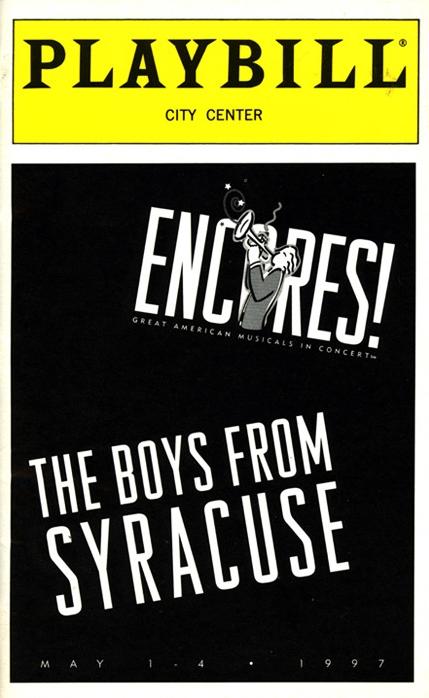
Version 6
Boys from Syracuse (The) (1997-05-New York City Center) Encores! Concert
Type de série: ConcertThéâtre: New York City Center (Broadway - Etats-Unis) Durée : Nombre : 0 previews - 5 représentationsPremière Preview : Inconnu
Première: 01 May 1997
Dernière: 04 May 1997Mise en scène : Susan H. Schulman • Chorégraphie : Kathleen Marshall • Producteur : Star(s) :
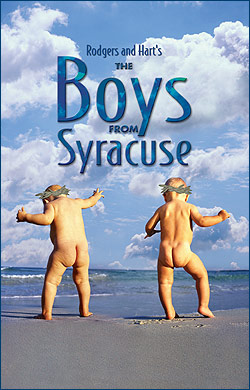
Version 7
Boys from Syracuse (The) (2002-07-American Airlines Theatre-Broadway)
Type de série: RevivalThéâtre: American Airlines Theatre (Broadway - Etats-Unis) Durée : 2 mois Nombre : 29 previews - 73 représentationsPremière Preview : 23 July 2002
Première: 18 August 2002
Dernière: 20 October 2002Mise en scène : Scott Ellis • Chorégraphie : Rob Ashford • Producteur : Star(s) : Avec: Fred Inkley (A Sergeant), J.C. Montgomery (The Duke), Walter Charles (Aegean), Scott Robertson (A Merchant), Davis Kirby (A Soldier), Jonathan Dokuchitz (Antipholus of Syracuse), Lee Wilkof (Dromio of Syracuse), Tom Hewitt (Antipholus of Ephesus), Chip Zien (Dromio of Ephesus), Joseph Siravo (A Tailor), Kirk McDonald (An Apprentice), Toni Dibuono (Luce), George Hall (A Sorcerer), Lauren Mitchell (Adriana), Erin Dilly (Luciana), Jackee Harry (Madam), Jeffrey Broadhurst (Angelo); Courtesans: Sara Gettelfinger, Deidre Goodwin, Milena Govich, Teri Hansen, Elizabeth Mills
Pas encore de video disponible pour ce spectacle